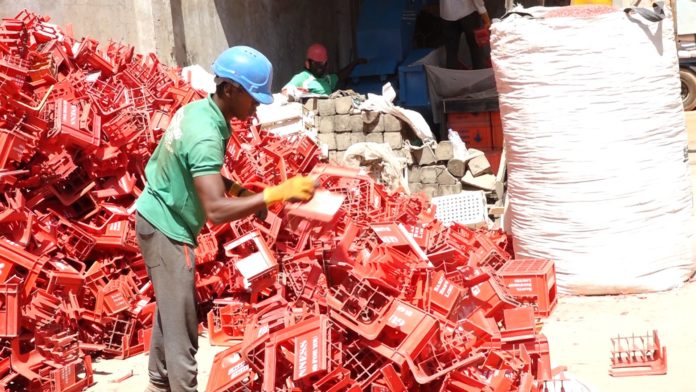By Sarjo Brito
Few years ago, the Bakoteh dumpsite was just a dumpsite, filled with all sorts of trash like plastic bottles and car parts waiting to be burned. Today, scavengers are swarming to the famous dumpsite daily looking for anything that can be recycled and one of those is plastic. Plastic waste management has increasingly become a tropical issue, especially the contamination of fresh and marine water environments. Research shows that nearly 513 million tonnes of plastic end up in the ocean every year. In Africa, countries like Egypt and Nigeria rank high as major polluters.
Alieu Sowe is an environmentalist and plastic recycling entrepreneur who gave up living in the West and returning home to fight against environmental pollution in The Gambia. Now owning and employing dozens of young Gambians to work at his plastic recycling firm, Alieu Sowe said besides being an environmentalist, he was inspired by the idea of creating job opportunities for the youths.
“The inspiration has always been one thing. To come back home and create opportunities for myself and my fellow youth. I have a lot of my family depending on me and most of them are youths. So, if I can come back home to create opportunities like these, it is like taking a burden off myself. It is one thing to open a shop and run a one-man business, but creating a company or a project which will include hundreds of people is something that inspires me,” Sowe said.
The Gambia continues to grapple with some environmental challenges, even after laws were passed banning the importation of plastic but its enforcement remains a major problem. Major polluters like China have also banned the importation of plastic, with many African environmentalists like Alieu Sowe raising concerns as they fear importers will now divert their attention to vulnerable African countries.
“It is a concern. It has been banned in The Gambia, but it is not enforced. So, if it is enforced in other countries, they turn to where they can bring it in easily. You can now see all kinds of plastics in our markets now. It is definitely a concern and we have been talking about it with the National Environment Agency and the Ministry of Environment to see what we can do on our part as recyclers,” Sowe said.
From trash to raw plastic, how does it work? We asked.
“These items like you see are in different colours, types and qualities. We collect them from collection points or have scavengers who normally buy for us. Once they arrive in the warehouse, we begin by segregating them into colours and qualities. We then cut them into pieces, wash, dry them and then put them in the grinder. Once they are grinded, we package them into 25kg bags and sell to manufacturers,” Sowe said.
Even though the young entrepreneurs do not manufacture, the future looks already bright as they now have everything in place to begin manufacturing raw plastic into finished items. Sowe also shared new recycling ideas he’s working on as they look into glass bottles which he hopes can be grinded to make pavement tiles.
Alieu Sowe said Africa’s solution to its overgrowing plastic issue is one thing: recycling.




